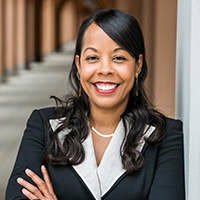
Creating a Complete Picture as a Public Defender

San Diego Public Defender’s Office
How I got to where I am today is the product of many lived experiences that began in my childhood. My childhood was filled with experiences that I believe it is best children do not experience — parents with substance abuse disorders, neglect, and physical abuse. These experiences served as a catalyst for me to depend on my maternal grandmother for the provision of my daily needs as a child, and because of her I did not grow up in the foster care system. Still, despite everything, my mother was instrumental in instilling in me the value of education and community service.
When I was in middle school and high school, my home environment improved, and my parents’ setbacks strengthened my resolve to become self-sufficient by attending college. My twin sister and I are the first college graduates of our family. We are also the first to earn master’s degrees, with me being the first to obtain a Juris Doctorate. While at college I learned that regardless of my family background, poverty, and abuse, I was a useful, honorable, and compassionate human being, and the opportunity to succeed was available even to me.
My goal was to obtain a doctoral degree in child psychology, but that did not come to fruition once I began to work as a clinical social worker with severely abused and neglected children in the juvenile dependency system. As a clinical social worker, I had the opportunity to appear in court and to provide an opinion on the family’s progress and on whether parental rights should be terminated. I soon realized that the clinical aspects of the families were minimized or absent in the legal representation. This concerned me deeply, because how can justice be rendered if there is an incomplete picture in the courtroom? That experience was pivotal in my decision to attend law school so I could become a legal advocate that presented the complete picture.
When I attended law school, I interned for the Office of the Public Defender and discovered my love for criminal defense advocacy. I wanted to help the indigent population by providing excellent lawyering as a deputy public defender, and I wanted my clients to know they were receiving the best representation possible, despite having an “appointed” lawyer. I also wanted to be part of the checks and balances of the criminal justice system, and to bring humanity into the decision-making process that is sometimes lacking in the criminal justice system.
To perfect my craft as trial lawyer, I completed a training program at the National Criminal Defense College in addition to trainings offered through the National Association of Criminal Defense Lawyers, National Association for Public Defense, and the California Public Defender’s Association.
As a trial lawyer, the greatest risk comes when presenting a case to a jury: a group of strangers who do not know the parties, the client, nor each other will sit in judgment and decide my client’s fate as to innocence or guilt. My job is to present the case in a human, relatable way that does not risk offending the jury, nor leave them confused or with more questions than answers. Instead, I strive to leave them with a good understanding of the case, the burden of proof, and with a strong commitment to render justice for my client. Yet, this is one of the risks I enjoy most of the job because it requires the greatest time with the client, attention to detail, research, creativity, and preparation.
As a deputy public defender, I have accomplished my goals and I am gratified when I hear judges, colleagues and even adversaries speak favorably about my lawyering. The greatest compliments, however, come from clients who express gratitude for my representation.
One such compliment that I treasure is when I was diagnosed with breast cancer, which required me to be on intermittent medical leave for over a year. I had a number of life-top cases (homicide, sodomy, and home invasion robbery with a gun) at the time, and I did not think it was fair for my clients to wait for my return. I offered each of them the option to have another attorney assigned to their cases, but each one refused to have a new attorney. Instead, each waited for my return — that kind of loyalty and trust is truly one of the greatest compliments of my career.
To anyone who practices or has an interest in practicing in criminal law or criminal defense, I encourage them to join the SDCBA’s newly minted Criminal Law Section, of which I have the privilege to serve as Vice Chair alongside Chair Blanca Quintero. The Criminal Law Section aims to connect criminal justice lawyers, both prosecutors and defense attorneys, to promote civility, advance criminal legal education, and work to ensure equal access to justice for all.
I also encourage criminal law practitioners to keep the following in mind:
- Choose this field only if you are truly passionate about this area of the law because it is grueling work at all levels—intellectually, mentally, emotionally and physically—and it is made easier if you are genuinely interested.
- Be excellent in all aspects of your representation. Naturally, no one is perfect, but it is important to strive for excellence because it builds your confidence and ensures your work product is indeed providing effective assistance of counsel; and
- Always keep humanity at the forefront of your advocacy because it is the only way to fight the good fight.
I am proud to say that I have been a deputy public defender since 2005, and there is not a day at work that I do not appreciate the privilege to serve our community as “Yahairah Aristy, Deputy Public Defender.”